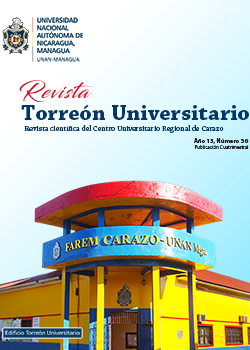Educación inclusiva para no oyentes del Instituto Miguel de Cervantes, Managua
DOI:
https://doi.org/10.5377/rtu.v13i38.19120Palabras clave:
Educación, inclusivo, sociedad, conocimiento, paradigmaResumen
El objetivo principal de esta investigación es identificar los principales logros, retos y desafíos de la educación inclusiva para no oyentes del Instituto Miguel de Cervantes, Managua. Dándose así a conocer como unos de los pioneros a nivel municipal en la educación inclusiva siendo un logro para el instituto el poder trabajar y ser participe en la educación de la población no oyente.
La investigación se sitúa en un enfoque mixto precisamente porque consiste en un conjunto de procesos sistemáticos, empíricos y críticos de investigación que implican la recolección y el análisis de datos cuantitativos y cualitativos, se realizó entrevista con estudiantes, de igual manera a docentes de educación inclusiva. La unidad de análisis de la presente investigación está constituida por una muestra no probabilística adecuada de manera intencional o por conveniencia por estudiantes de educación secundaria del Instituto Miguel de Cervantes Saavedra.
Algo importante que se puede recalcar es que estos estudiantes están inmersos en un aula de clase como un estudiante activo e incluido con sus compañeros y la sociedad.
Descargas
252
HTML 28
PDF (English) 45
HTML (English) 15
Citas
Arias, F. (2012). El proyecto de Investigación. Introducción a la metodología científica. (6ta ed.). Caracas: Episteme.
Alisedo, G (2006) El aprendizaje de la lengua escrita por el alumno sordo. Ministerio de Educación
Delval (1991). Función social de la Educación.
Hernández, Fernández y Baptista (2014), Metodología de la Investigación científica, sexta edición.
UNESCO (1995). La lengua de señas.
UNESCO. (2008). Conferencia Internacional de Educación la educación inclusiva: el camino hacia el futuro. Recuperado de: www.ibe. Unesco .org/.../user.../ Confinted_48 3_Spanish.pdf
Descargas
Publicado
Cómo citar
Número
Sección
Licencia
Derechos de autor 2024 Universidad Nacional Autónoma de Nicaragua, Managua

Esta obra está bajo una licencia internacional Creative Commons Atribución-NoComercial-SinDerivadas 4.0.
Los autores que publican en esta revista están de acuerdo con los siguientes términos.
- El autor o los autores de los artículos, ensayos o investigaciones conceden a la Universidad Nacional Autónoma de Nicaragua, Managua (UNAN-Managua) los derechos de edición (copyright) del trabajo enviado, por consiguiente la Universidad cuenta con el derecho exclusivo para publicar el artículo durante el periodo completo de los derechos de autor.
- Estos derechos de autor/ autores autorizan a la Revista Torreón Universitario y a la Universidad editar y divulgar/publicar el artículo en dicha Revista, incluyendo reproducción impresa y electrónica, el almacenamiento, recuperación y cualquier otro tipo de publicación, y fuentes de información secundaria como servicios de resúmenes y bases de datos, así mismo la facultan a proteger el artículo contra el uso no autorizado para su difusión por medios impresos o electrónicos (PDF, HTML, EPUB, XML u otros).
Licencia para el uso del contenido
La revista hace uso de la Licencia Creative Commons Atribución-NoComercial-SinDerivar 4.0 Internacional.
Bajo esta declaración:

Este revista está sujeta a una licencia de Creative Commons Reconocimiento-NoComercial-SinObraDerivada 4.0 Internacional. Puede ser copiada, distribuida y transmitida públicamente siempre y cuando se cite al autor y la fuente (Revista Torreón Universitario), no debe modificarse ni utilizarse con ningún fin comercial. La licencia completa se puede consultar en http://creativecommons.org/licenses/by-nc-nd/4.0/.



